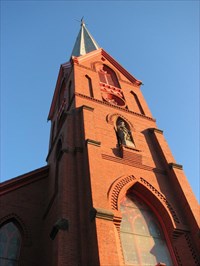 |
| Bishop Liam Cary |
In addition, about 17 priests, one deacon, and three nuns traveled
various distances to be at the Mass.
St. Bridget church is small – it’s one of a number of “mission churches” built in Oregon in the 1900’s – and this one was actually completed in 1958. You can view some photos here. The church does have a little choir loft which is actually used! There’s also a “cry room”, which was also in active use by a number of young moms with their babies.
After the procession, Bishop Cary gave a few words of
explanation before he led the congregation in the daytime prayer of the Office
of the Dead. He noted that reciting this prayer of the Church would enhance our
prayers for Fr. Daniel.
During his homily, Bishop Cary noted that a funeral with the
body present had been held in Nigeria a week previous, but suggested that
because “the altar of sacrifice is present in all time”, we could consider
ourselves there during this Mass,
since our intention was to be joined in prayer to those who did so last week.
Bishop Cary described what the rite would look like if the
body were present, noting that the funeral liturgy pays particular reverence to
the body, because it is the image of God. During a funeral Mass, the casket is
sprinkled with holy water, recalling the person’s baptism; the procession to
the altar, Bishop Cary said, may remind us of the individual’s “journey through
life” – he is baptized and then begins the journey towards death that leads to
eternal life. At the end of a funeral Mass, the body (casket) is incensed, and
the smoke of the incense represents our prayers ascending to God. Left below is
the fragrance of the incense, reminding us of the good we experienced in the
deceased.
Finally, at a funeral Mass, there is the burial at the
cemetery. There, said Bishop Cary, we can remember the words of the Gospel read
today (John 11:17-27; the death of Lazarus): “Your brother will rise.” His death
has been conquered.
But this Mass, the bishop reminded us, was for a priest. A
priest’s body is different, special; the priest has been anointed for a special
work of God – “especially his hands,” said Bishop Cary. “St. Thomas tells us
that the sacraments are the prolongation of the hands of Christ.
The priests
hands are anointed, consecrated, set apart to do God’s work.”
And what do the priest’s hands do? During baptism, the
priest uses his hands to anoint the individual with oil and to pour the water
over the individual’s head; at the end of life, the same hands anoint the sick.
And of course, those priestly, anointed hands to a most
important work when they offer the Holy Sacrifice of the Mass.
“Jesus hands the bread of life and the cup of salvation to his disciples.
How many received the bread of life from Fr. Daniel?” said Bishop Cary. “We are
here to reverence that and honor his work. At a funeral, it’s clear that bodily
life has come to death. But with eyes of faith, we see that ‘your brother will
rise’.”
Biographical
Information about Fr. Daniel Ochiabuto:
Fr. Daniel was born on June 15, 1973 in Umuahia, Nigeria. He
attended Bigard Memorial Seminary in Enugu (1998-2002) and Seat of Wisdom
Seminary in Owerri in Imo State.(2003-2007). He was ordained a deacon in 2006,
and was ordained to the priesthood on July 28, 2007 in Umuahia Diocese. He
arrived in the Diocese of Baker in October 2009.
Fr. Daniel served as associate pastor at Our Lady of the
Valley Church in La Grande, Oregon, and in January 2011 he was made pastor of St.
Bridget of Kildare in Nyssa.
Fr. Daniel became seriously ill with malaria in March 2012; he had been home for a visit, and returned to Oregon where it became apparent that he had not recovered. St. Bridget parishioners covered the cost of his return to Nigeria for treatment. Tragically, Fr. Daniel was struck by a vehicle in Umuahia, Nigeria in late May, and died from his injuries on June 1, 2012 at the age of 39.



















